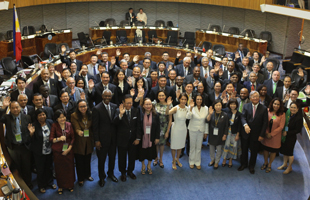
WHO/A. Esquillon
Countries from Bhutan to the Cook Islands today pledged to redouble efforts to jointly tackle the pressing issues of climate change, air pollution, safe water, sanitation and hazardous chemicals in pursuit of health and sustainable development.
Concluding the Asia-Pacific Regional Forum on Health and Environment, ministers and officials from 14 countries signed the Manila Declaration, which also calls for action on the emerging issues of (1) antimicrobial resistance, (2) transboundary haze and air pollution, (3) transnational waste shipments, and (4) marine pollution and destruction of coral reefs.
"We are honoured that the output of this Regional Forum will be known as the Manila Declaration on Health and the Environment. This Declaration synthesizes the needed collaboration between the health and environment sectors, both within and between countries," said Leni Robredo, Vice President of the Philippines.
"It is strategic and incisive, for it specifies specific sustainable development goals which the two sectors can work on together to achieve quick wins. We look forward to the implementation of the agreements," added the Vice President.
“As a public health practitioner, I know that health cannot be improved without addressing the environment. It is stating the obvious to say that clean air and safe water, food and sanitation are basic requisites for a healthy life. For us in the health sector, provision of health-care services takes a lot of our time. Yet more hospitals, more doctors, and more nurses are not always the answer to the health problems we face,” said Dr Paulyn Jean Rossell-Ubial, Secretary, Philippine Department of Health.
“Rather than just simply being the ambulance at the bottom of the cliff, ministries of health must look upstream and advocate for clean sources of energy, healthy housing, environmental protection, and active transport to name a few of the areas that have enormous influence on our health. In this era of sustainable development, the health sector has to reinvent itself as a champion of the Sustainable Development Goals,” Secretary Ubial added.
"Women hold up half the sky. We will fight to ensure that the air above is clean, the land around us is free from harmful chemicals and the water below is safe," said Senator Risa Hontiveros of the Philippines.
Meanwhile, Philippine Department of Environment and Natural Resources Secretary Regina Paz L. Lopez said, “Sustaining and improving the quality of the environment to promote and enhance public health is key to achieving social justice. A healthy environment is a pre-requisite to socioeconomic development and human well-being."
“The only way forward is for Member States to adopt appropriate measures and actively work to attain the global targets of the Sustainable Development Goals (SDGs), and engage and ensure the participation of the private sector, nongovernmental organizations (NGOs), academia, civil society and the media in the implementation of good practices on SDG-related programmes,” she added.
Hosted by the Government of the Philippines, the forum highlighted the commitments made by each country under the Paris Agreement on climate change.
"Joint participation of health and environment experts at this forum demonstrates the open-minded attitude that could help break down barriers and nurture integration in many other areas, like finance, transport, energy and security," said Mr Ibrahim Thiaw, Deputy Executive Director, United Nations Environment Programme and Assistant Secretary-General, United Nations.
"We should spread these emerging partnerships to other sectors, such as air pollution which can't be tackled without a co-ordinated effort across transport, energy and finance," he said.
Dr Shin Young-soo, WHO Regional Director for the Western Pacific, underlined the role of the forum as a "concrete example of how we can best tackle emerging challenges when we come together and discuss issues of common concern openly".
Dr Poonam Khetrapal Singh, WHO Regional Director for South-East Asia, said, "Bold leadership is required to address the environmental determinants of health in our respective regions. By effectively addressing environmental health risks we have the opportunity to save lives and mitigate unnecessary ill-health. We must act now to convert our commitments and pledges into action.”
The forum reiterated that basic necessities for public health such as water quality, food safety and clean air must be carefully managed. Be it climate change that is shaping up as the health challenge of the century, haze in South-East Asia, air pollution in North Asia or sanitation and hazardous waste problems in the Pacific, it is imperative to create and sustain healthy communities by limiting pollution from power plants, factory farms and transport and at once building their resilience.
Participants recognized that integrating efforts for better environments and better health effectively across all the goals of the 2030 Sustainable Development Agenda and the Paris Agreement requires broader momentum at the national and community levels in member countries. Communities need to be better engaged to actively participate in SDG-related policy-making and action.
Note to editors
The Asia-Pacific Regional Forum on Health and Environment was established in 2007. Its secretariat consists of the WHO regional offices of South-East Asia and the Western Pacific, and the United Nations Environment Programme Regional Office for the Asia Pacific. It is an initiative of 14 countries (ASEAN + 4) to strengthen the cooperation of environment and health authorities within and among the countries. At this, the fourth three-yearly Ministerial Regional Forum, all countries of the WHO regions of South-East Asia and the Western Pacific were invited to attend, reflecting the interest of those countries in the activities of the forum and recognition that environmental health concerns transcend all borders and that no countries should be left behind.
